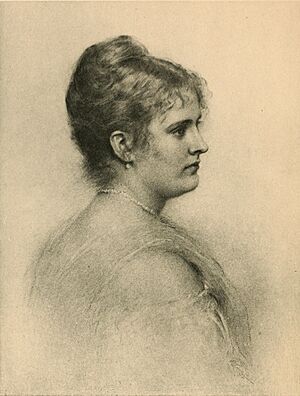Maud Howe Elliott facts for kids
Quick facts for kids
Maud Howe Elliott
|
|
|---|---|
 |
|
| Born | November 9, 1854 Boston, Massachusetts, US |
| Died | March 19, 1948 (aged 93) Newport, Rhode Island, US |
| Occupation | Novelist |
| Notable awards | 1917 Pulitzer Prize |
| Spouse | John Elliott |
Maud Howe Elliott (born November 9, 1854 – died March 19, 1948) was an American writer. She is best known for winning a Pulitzer Prize. This award was for a book she wrote with her sisters, Laura E. Richards and Florence Hall. The book was a biography about their mother, The Life of Julia Ward Howe (1916).
Maud also wrote many other books. Some of her works include A Newport Aquarelle (1883) and Sun and Shadow in Spain (1908). She also wrote This Was My Newport (1944).
Contents
Early Life and Family
Maud Howe was born on November 9, 1854. Her birthplace was the Perkins School for the Blind in Boston. Her father, Samuel Gridley Howe, founded this school. Her mother was Julia Ward Howe, a famous writer. Julia Ward Howe also worked to end slavery.
Marriage and Moving
In 1887, Maud married John Elliott. He was an artist from England. After getting married, she lived in different places. She lived in Chicago for a short time. She also spent several years living in Italy. Later, she moved to Newport, Rhode Island. She lived there for the rest of her life.
Maud's Important Work
Maud Howe Elliott was a very active person. She helped start many important groups. She was a founding member of the Newport Art Association. She worked as its secretary for 30 years.
Fighting for Women's Rights
Maud also helped start the Progressive Party. This group worked for social and political changes. She was a strong supporter of the women's suffrage movement. This movement fought for women to have the right to vote. Maud believed women should be free to choose their own roles. She was greatly inspired by her mother's ideas.
In 1920, women finally gained the right to vote in the U.S. However, Maud Howe Elliott could not vote. A law took away her citizenship because she married a foreigner. This law only affected American women who married men from other countries. Men who married foreign citizens kept their citizenship.
Writing About Travel
Maud wrote a travel book called Sun and Shadow in Spain (1908). This book helped make Spain a popular place for tourists. It encouraged many people from America and Europe to visit.
Later Life and Recognition
In 1940, Brown University gave Maud an honorary degree. This was a special award for her achievements. She was given the title of Doctor of Letters. Maud Howe Elliott passed away on March 19, 1948, in Newport, Rhode Island.
 | William Lucy |
 | Charles Hayes |
 | Cleveland Robinson |

